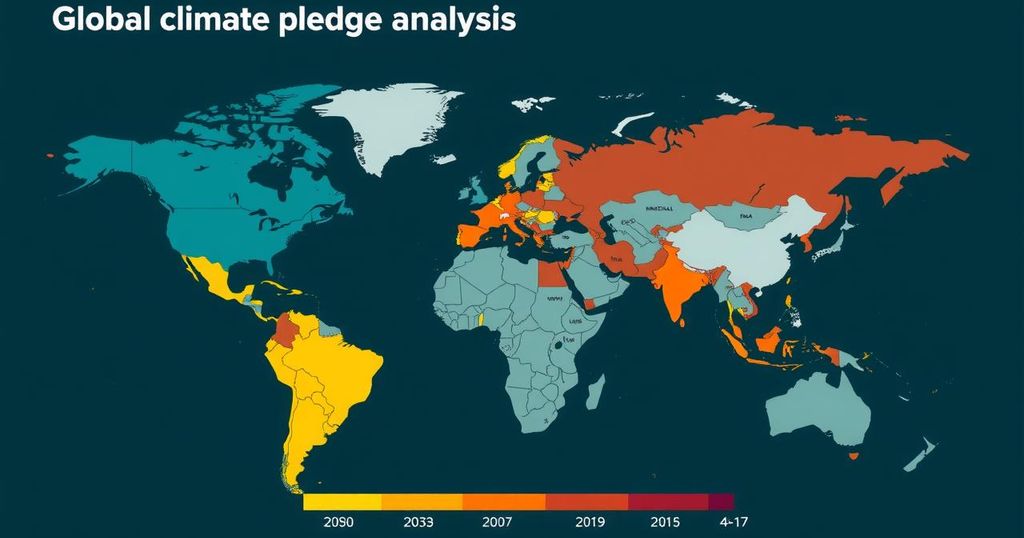A recent UNFCCC report highlights that national climate pledges are projected to reduce emissions by only 2.6 percent by 2030, falling far short of the 43 percent reduction required to meet the Paris Agreement targets. The upcoming COP29 climate talks may provide a platform for nations to strengthen their commitments and develop innovative financing strategies to support climate action in developing countries.
A recent report from the United Nations Framework Convention on Climate Change (UNFCCC) indicates that the climate pledges made by nations are insufficient to significantly curb global greenhouse gas emissions by the target date of 2030. These current commitments, known as nationally determined contributions (NDCs), are projected to achieve only a 2.6 percent reduction in emissions from 2019 levels, which is only a slight increase from the 2 percent noted last year. This reduction starkly contrasts with the 43 percent decrease that scientists deem necessary to align with the Paris Agreement’s goal of limiting global temperature rise to 1.5 degrees Celsius (2.7 degrees Fahrenheit). In light of these findings, UNFCCC Executive Secretary Simon Stiell stressed the urgency of formulating stronger NDCs ahead of the upcoming climate negotiations set to take place in Baku, Azerbaijan. Stiell stated that the current national plans “fall miles short of what’s needed to stop global heating from crippling every economy and wrecking billions of lives and livelihoods across every country.” As countries prepare for the COP29 climate talks, it is anticipated that they will work towards establishing a new global emissions trading system and a financing initiative of $100 billion annually to support developing nations in their climate endeavors. The NDC Partnership, led by Pablo Vieira, has expressed that countries are likely engaging in negotiations to secure additional funding for enhanced climate ambitions. The ultimate goal is for new NDCs to be both attractive to public and private investments, ensuring the necessary resources are available to address climate change effectively. Additionally, a separate report from the World Meteorological Organization (WMO) outlines concerning trends in atmospheric greenhouse gases, which have escalated more rapidly over the last two decades than at any previous point in human history. Notably, carbon dioxide levels have surged by more than 11 percent over the past two decades, with 2022 experiencing the second-largest annual increase of the past ten years. The data indicates an alarming trajectory, with CO2 concentrations now 51 percent higher than pre-industrial levels, while methane levels are 165 percent higher than those recorded in 1750. In response to these developments, WMO Secretary-General Celeste Saulo emphasized that every incremental rise in temperature poses significant risks to the planet and human life. The UN Environment Programme has echoed these sentiments, warning that the gap between pledged commitments and necessary actions must be addressed without delay to avert disastrous climate consequences.
The issue of climate change is a pressing global challenge that demands immediate and collective action from nations around the world. The United Nations Framework Convention on Climate Change (UNFCCC) serves as a central framework for international climate negotiations, where countries outline their climate action plans through nationally determined contributions (NDCs). These contributions are critical in the collective effort to maintain global temperatures within safe limits, as established by the Paris Agreement of 2015. However, recent assessments reveal that current climate commitments lack the ambition required to meet established targets, thus necessitating enhanced pledges ahead of major forthcoming negotiations.
In summary, current climate pledges set forth by nations are significantly inadequate, with anticipated emissions reductions far below what is necessary to meet the critical goals of the Paris Agreement. The upcoming COP29 talks present a vital opportunity for countries to re-evaluate and strengthen their commitments to combat climate change effectively. Heightened international cooperation, innovative financing solutions, and increased public and private investment are essential for bridging the substantial gap between promises and actions. The scientific consensus underscores the urgency for decisive action to mitigate the dire consequences of global warming.
Original Source: www.aljazeera.com






